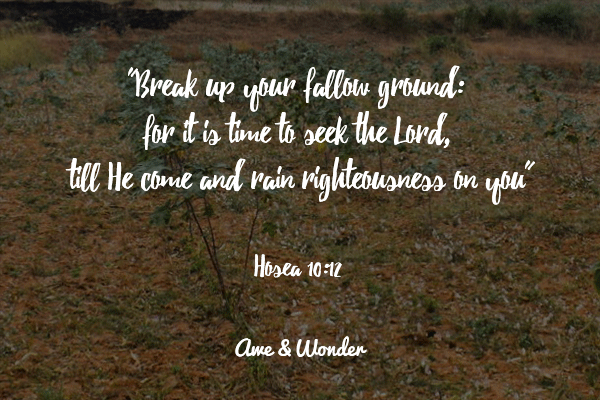“The fallow field is smug, contented, protected from the shock of the plow and the agitation of the harrow. Such a field, as it lies year after year, becomes a familiar landmark to the crow and the blue jay. Had it intelligence, it might take a lot of satisfaction in its reputation: it has stability; nature has adopted it; it can be counted upon to remain always the same, while the fields around it change from brown to green and back to brown again. Safe and undisturbed, it sprawls lazily in the sunshine, the picture of sleepy contentment.
But it is paying a terrible price for its tranquility; never does it feel the motions of mounting life, nor see the wonders of bursting seed, nor the beauty of ripening grain. Fruit it can never know, because it is afraid of the plow and the harrow.
In direct opposite to this, the cultivated field has yielded itself to the adventure of living. The protecting fence has opened to admit the plow, and the plow has come as plows always come, practical, cruel, business-like and in a hurry. Peace has been shattered by the shouting farmer and the rattle of machinery. The field has felt the travail of change; it has been upset, turned over, bruised and broken.
But its rewards come hard upon its labors. The seed shoots up into the daylight its miracle of life, curious, exploring the new world above it. All over the field, the hand of God is at work in the age-old and ever renewed service of creation. New things are born, to grow, mature, and consumate the grand prophecy latent in the seed when it entered the ground. Nature’s wonders follow the plow.
There are two kinds of lives also: the fallow and the plowed. For example of the fallow life, we need not go far. They are all too plentiful among us.
The man of fallow life is contented with himself and the fruit he once bore. He does not want to be disturbed. He smiles in tolerant superiority at revivals, fastings, self- searching, and all the travail of fruit bearing and the anguish of advance. The spirit of adventure is dead within him. He is steady, “faithful,” always in his accustomed place (like the old field), conservative, and something of a landmark in the little church. But he is fruitless.
The curse of such a life is that it is fixed, both in size and in content. “To be” has taken the place of “to become.” The worst that can be said of such a man is that he is what he will be. He has fenced himself in, and by the same act he has fenced out God and the miracle.
The plowed life is the life that has, in the act of repentance, thrown down the protecting fences and sent the plow of confession into the soul. The urge of the Spirit, the pressure of circumstances and the distress of fruitless living have combined thoroughly to humble the heart. Such a life has put away defense, and has forsaken the safety of death for the peril of life.
Discontent, yearning, contrition, courageous obedience to the will of God: these have bruised and broken the soil till it is ready again for the seed. And, as always, fruit follows the plow. Life and growth begin as God “rains down righteousness.” Such a one can testify – And the hand of the Lord was upon me there. (Ezek. 3:22)”
– A W Tozer








2 Responses
Reblogged this on The Potter's Clay.
Reblogged this on The Potter's Clay.